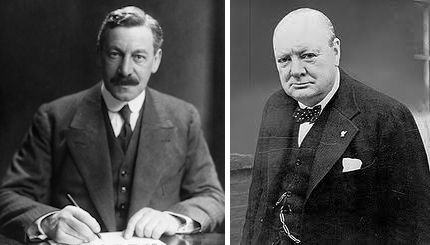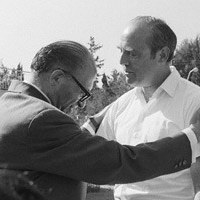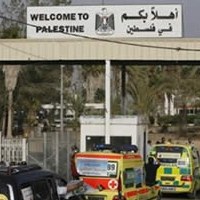![]()
Edited by Crethi Plethi
The British White Paper (also known as The Churchill White Paper) of 3 June 1922 was the first official interpretation of the 1917 Balfour Declaration by the British Government after investigation of the Arab riots of 1920-1921 and months of fruitless negotiations between the British Colonial Office — which was at the time headed by Colonial Secretary Winston Churchill — and Arab and Zionist delegations.
The ‘White Paper’ policy statement was based on a speech presented by the High Commissioner for Palestine, Sir Herbert Samuel, [June 3, 1921] as well as on ‘White Paper’ Palestine correspondence between the British Colonial Office, the Palestine Arab Delegation and the Zionist Organization. It was published as a White Paper in June 1922.
The 1917 Balfour Declaration was a statement of support made by the British Government [the War Cabinet] for the “establishment of a national home for the Jewish people in Palestine.” But Arabs in Palestine opposed the establishment of a Jewish National Home in Palestine and didn’t want to accept the legitimacy of the Balfour Declaration. The Arabs also objected “a great immigration of alien Jews” into Palestine.
The 1922 White Paper therefore needed to clarify the understanding and intent of the British government and was an attempt to address conflicting claims resulting from the Hussein-McMahon Correspondence, Sykes-Picot Agreement and subsequent Balfour Declaration.
The White Paper main provisions,
— “So far as the Jewish population of Palestine are concerned it appears that some among them are apprehensive that His Majesty’s Government may depart from the policy embodied in the Declaration of 1917. It is necessary, therefore, once more to affirm that these fears are unfounded, and that that Declaration, re affirmed by the Conference of the Principle Allied Powers at San Remo and again in the Treaty of Sevres, is not susceptible of change.”
— “This [Jewish] community, then, with its town and country population, its political, religious, and social organizations, its own language, its own customs, its own life, has in fact “national” characteristics….it is essential that it should know that it is in Palestine as of right and not on the sufferance. That is the reason why it is necessary that the existence of a Jewish National Home in Palestine should be internationally guaranteed, and that it should be formally recognized to rest upon ancient historic connection.”
— Concerning the Arab objection against Jewish immigration, the White Paper stated, “For the fulfilment of this policy it is necessary that the Jewish community in Palestine should be able to increase its numbers by immigration”, although “this should not exceed the economic absorptive capacity of the country.”
— The White Paper tried to reassure the Arabs of Palestine, that there was no question of Palestine becoming “as Jewish as England is English. His Majesty’s Government regard any such expectation as impracticable and have no such aim in view. Nor have they at any time contemplated, as appears to be feared by the Arab delegation, the disappearance or the subordination of the Arabic population, language, or culture in Palestine. They would draw attention to the fact that the terms of the Declaration referred to do not contemplate that Palestine as a whole should be converted into a Jewish National Home, but that such a Home should be founded ‘in Palestine.'” As result, in July 1922 the British partitioned the area of the Palestine Mandate by excluding the east of the Jordan River from Jewish settlement. That part was given to the Emir Abdullah, 76% of the original Palestine Mandate area, and subsequently renamed Transjordan.
— The British Government also denied in the White Paper that “it is not the case, as has been represented by the Arab Delegation, that during the war His Majesty’s Government gave an undertaking that an independent national government should be at once established in Palestine. This representation mainly rests upon a letter dated the 24th October, 1915, from Sir Henry McMahon, then His Majesty’s High Commissioner in Egypt, to the Sharif of Mecca, now King Hussein of the Kingdom of the Hejaz. That letter is quoted as conveying the promise to the Sherif of Mecca to recognise and support the independence of the Arabs within the territories proposed by him. But this promise was given subject to a reservation made in the same letter, which excluded from its scope, among other territories, the portions of Syria lying to the west of the District of Damascus. This reservation has always been regarded by His Majesty’s Government as covering the vilayet of Beirut and the independent Sanjak of Jerusalem. The whole of Palestine west of the Jordan was thus excluded from Sir. Henry McMahon’s pledge.” The British Government therefore rejected the Arab claim that an independent [Arab] national government should include Palestine west of the Jordan as well.
The 1922 White Paper was formally accepted by the Zionist Organization, but rejected by the Arabs in Palestine. Despite the Arabs’ rejection, the British Government approved the White Paper. As a result, the 1922 White Paper did not resolve the Palestine issue concerning the Jewish and Arab claims to the land.
Full text — British White Paper 1922
The Secretary of State for the Colonies has given renewed consideration to the existing political situation in Palestine, with a very earnest desire to arrive at a settlement of the outstanding questions which have given rise to uncertainty and unrest among certain sections of the population. After consultation with the High Commissioner for Palestine [Sir Herbert Samuel] the following statement has been drawn up. It summarizes the essential parts of the correspondence that has already taken place between the Secretary of State and a delegation from the Moslem Christian Society of Palestine, which has been for some time in England, and it states the further conclusions which have since been reached.
The tension which has prevailed from time to time in Palestine is mainly due to apprehensions, which are entertained both by sections of the Arab and by sections of the Jewish population. These apprehensions, so far as the Arabs are concerned are partly based upon exaggerated interpretations of the meaning of the [Balfour] Declaration favouring the establishment of a Jewish National Home in Palestine, made on behalf of His Majesty’s Government on 2nd November, 1917.
Unauthorized statements have been made to the effect that the purpose in view is to create a wholly Jewish Palestine. Phrases have been used such as that Palestine is to become “as Jewish as England is English.” His Majesty’s Government regard any such expectation as impracticable and have no such aim in view. Nor have they at any time contemplated, as appears to be feared by the Arab delegation, the disappearance or the subordination of the Arabic population, language, or culture in Palestine. They would draw attention to the fact that the terms of the Declaration referred to do not contemplate that Palestine as a whole should be converted into a Jewish National Home, but that such a Home should be founded `in Palestine.’ In this connection it has been observed with satisfaction that at a meeting of the Zionist Congress, the supreme governing body of the Zionist Organization, held at Carlsbad in September, 1921, a resolution was passed expressing as the official statement of Zionist aims “the determination of the Jewish people to live with the Arab people on terms of unity and mutual respect, and together with them to make the common home into a flourishing community, the upbuilding of which may assure to each of its peoples an undisturbed national development.”
It is also necessary to point out that the Zionist Commission in Palestine, now termed the Palestine Zionist Executive, has not desired to possess, and does not possess, any share in the general administration of the country. Nor does the special position assigned to the Zionist Organization in Article IV of the Draft Mandate for Palestine imply any such functions. That special position relates to the measures to be taken in Palestine affecting the Jewish population, and contemplates that the organization may assist in the general development of the country, but does not entitle it to share in any degree in its government.
Further, it is contemplated that the status of all citizens of Palestine in the eyes of the law shall be Palestinian, and it has never been intended that they, or any section of them, should possess any other juridical status. So far as the Jewish population of Palestine are concerned it appears that some among them are apprehensive that His Majesty’s Government may depart from the policy embodied in the Declaration of 1917. It is necessary, therefore, once more to affirm that these fears are unfounded, and that that Declaration, re affirmed by the Conference of the Principle Allied Powers at San Remo and again in the Treaty of Sevres, is not susceptible of change.
During the last two or three generations the Jews have recreated in Palestine a community, now numbering 80,000, of whom about one fourth are farmers or workers upon the land. This community has its own political organs; an elected assembly for the direction of its domestic concerns; elected councils in the towns; and an organization for the control of its schools. It has its elected Chief Rabbinate and Rabbinical Council for the direction of its religious affairs. Its business is conducted in Hebrew as a vernacular language, and a Hebrew Press serves its needs. It has its distinctive intellectual life and displays considerable economic activity. This community, then, with its town and country population, its political, religious, and social organizations, its own language, its own customs, its own life, has in fact “national” characteristics. When it is asked what is meant by the development of the Jewish National Home in Palestine, it may be answered that it is not the imposition of a Jewish nationality upon the inhabitants of Palestine as a whole, but the further development of the existing Jewish community, with the assistance of Jews in other parts of the world, in order that it may become a centre in which the Jewish people as a whole may take, on grounds of religion and race, an interest and a pride. But in order that this community should have the best prospect of free development and provide a full opportunity for the Jewish people to display its capacities, it is essential that it should know that it is in Palestine as of right and not on the sufferance. That is the reason why it is necessary that the existence of a Jewish National Home in Palestine should be internationally guaranteed, and that it should be formally recognized to rest upon ancient historic connection.
This, then, is the interpretation which His Majesty’s Government place upon the Declaration of 1917, and, so understood, the Secretary of State is of opinion that it does not contain or imply anything which need cause either alarm to the Arab population of Palestine or disappointment to the Jews.
For the fulfilment of this policy it is necessary that the Jewish community in Palestine should be able to increase its numbers by immigration. This immigration cannot be so great in volume as to exceed whatever may be the economic capacity of the country at the time to absorb new arrivals. It is essential to ensure that the immigrants should not be a burden upon the people of Palestine as a whole, and that they should not deprive any section of the present population of their employment. Hitherto the immigration has fulfilled these conditions. The number of immigrants since the British occupation has been about 25,000.
It is necessary also to ensure that persons who are politically undesirable be excluded from Palestine, and every precaution has been and will be taken by the Administration to that end.
It is intended that a special committee should be established in Palestine, consisting entirely of members of the new Legislative Council elected by the people, to confer with the administration upon matters relating to the regulation of immigration. Should any difference of opinion arise between this committee and the Administration, the matter will be referred to His Majesty’s Government, who will give it special consideration. In addition, under Article 81 of the draft Palestine Order in Council, any religious community or considerable section of the population of Palestine will have a general right to appeal, through the High Commissioner and the Secretary of State, to the League of Nations on any matter on which they may consider that the terms of the Mandate are not being fulfilled by the Government of Palestine.
With reference to the Constitution which it is now intended to establish in Palestine, the draft of which has already been published, it is desirable to make certain points clear. In the first place, it is not the case, as has been represented by the Arab Delegation, that during the war His Majesty’s Government gave an undertaking that an independent national government should be at once established in Palestine. This representation mainly rests upon a letter dated the 24th October, 1915, from Sir Henry McMahon, then His Majesty’s High Commissioner in Egypt, to the Sharif of Mecca, now King Hussein of the Kingdom of the Hejaz. That letter is quoted as conveying the promise to the Sherif of Mecca to recognise and support the independence of the Arabs within the territories proposed by him. But this promise was given subject to a reservation made in the same letter, which excluded from its scope, among other territories, the portions of Syria lying to the west of the District of Damascus. This reservation has always been regarded by His Majesty’s Government as covering the vilayet of Beirut and the independent Sanjak of Jerusalem. The whole of Palestine west of the Jordan was thus excluded from Sir. Henry McMahon’s pledge.
Nevertheless, it is the intention of His Majesty’s overnment to foster the establishment of a full measure of self government in Palestine. But they are of the opinion that, in the special circumstances of that country, this should be accomplished by gradual stages and not suddenly. The first step was taken when, on the institution of a Civil Administration, the nominated Advisory Council, which now exists, was established. It was stated at the time by the High Commissioner that this was the first step in the development of self governing institutions, and it is now proposed to take a second step by the establishment of a Legislative Council containing a large proportion of members elected on a wide franchise. It was proposed in the published draft that three of the members of this Council should be non official persons nominated by the High Commissioner, but representations having been made in opposition to this provision, based on cogent considerations, the Secretary of State is prepared to omit it. The legislative Council would then consist of the High Commissioner as President and twelve elected and ten official members. The Secretary of State is of the opinion that before a further measure of self government is extended to Palestine and the Assembly placed in control over the Executive, it would be wise to allow some time to elapse. During this period the institutions of the country will have become well established; its financial credit will be based on firm foundations, and the Palestinian officials will have been enabled to gain experience of sound methods of government. After a few years the situation will be again reviewed, and if the experience of the working of the constitution now to be established so warranted, a larger share of authority would then be extended to the elected representatives of the people.
The Secretary of State would point out that already the present administration has transferred to a Supreme Council elected by the Moslem community of Palestine the entire control of Moslem Religious endowments (Waqfs), and of the Moslem religious Courts. To this Council the Administration has also voluntarily restored considerable revenues derived from ancient endowments which have been sequestrated by the Turkish Government. The Education Department is also advised by a committee representative of all sections of the population, and the Department of Commerce and Industry has the benefit of the co operation of the Chambers of Commerce which have been established in the principal centres. It is the intention of the Administration to associate in an increased degree similar representative committees with the various Deparments of the Government.
The Secretary of State believes that a policy upon these lines, coupled with the maintenance of the fullest religious liberty in Palestine and with scrupulous regard for the rights of each community with reference to its Holy Places, cannot but commend itself to the various sections of the population, and that upon this basis may be built up that a spirit of cooperation upon which the future progress and prosperity of the Holy Land must largely depend.



 RSS
RSS











[…] He took a general, sympathetic interest in the Jewish National Home policy, but it was only as colonial secretary (1921-2) that his support, previously counter-balanced by his unwillingness in the post-war era for […]